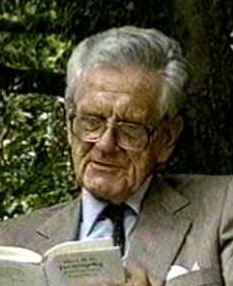Hans Merkle
 | |
| Born | 1 January 1913 Pforzheim |
| Died | 22 September 2000 (Age 87) Stuttgart |
| Nationality | German |
| Member of | European Round Table of Industrialists, The 1001 Club |
Triple Bilderberger. Centrally placed German business leader and chairman of Robert Bosch GmbH. Friend of Henry Kissinger. | |
Hans Lutz Merkle was chairman of the board of management of the German multinational engineering and technology company Robert Bosch GmbH. He was part of the continuity of leadership in the German economy from World War 2, when he was a high ranking National Socialist economic leader, to the post-war decades, when he was advisor to several governments and sat on many boards. On October 4, 2001, Henry Kissinger, who was a friend of Merkle, gave a memorial speech in Berlin.
Early career
After graduating from high school in 1931, Merkle first completed a commercial apprenticeship in his father's company and began his professional career in 1935 at the Ulrich Gminder textile factory in Reutlingen. Without completing a university degree - he had only studied as a guest student at the law faculty of the University of Tübingen - he managed to rise within the company, in which he became managing director in 1949, regardless of the fact that from 1942 to 1945 he was the general manager of the National Socialist association Reichsvereinigung Textilveredelung, whose main goal, "the rationalization of the cartel system in the textile finished goods industry, especially in the merger of existing cartels" represented a significant contribution to the organization of the war economy.[1]
Until 1958, Merkle was a member of the board of directors of Ulrich Gminder AG in Reutlingen. He then came to Robert Bosch GmbH as managing director with responsibility for investments, where his advancement continued. As the successor to Hans Walz, he was CEO from 1963. In 1984 he moved to the supervisory board, which he chaired, and later became personally liable partner and chairman of Robert Bosch Industrietreuhand KG (until 1993), which exercises the voting rights over the non-profit Robert Bosch Foundation, to which the heirs had transferred large parts of their assets (92% of the shares) at the instigation of Merkle, and thus represents the actual center of power.
In 1984, at his instigation, Marcus Bierich succeeded him as Bosch CEO. After leaving, he was appointed honorary chairman of the Bosch Group. During the period of his work, Bosch GmbH rose to become a global corporation, whose sales under Merkle as CEO increased from DEM 2 billion in 1963 to over DEM 18 billion in 1984 and by (2019) reached over EUR 77 billion.
For many years he was an advisor to CDU politicians; he nevertheless resigned from the party in 1979 after a "long thought process".[2] He organized the financial transactions of the Gesellschaft zur Förderung der Wirtschaft Baden-Württemberg, a money laundering facility for party donations, primarily to the CDU.[3] He was fined 600,000 DM for tax evasion of 1.5 million DM.[4]
Merkle was considered to be publicity shy, but was one of the last industrial managers to make almost unlimited decisions alone. In 1976 he became an honorary member of the Heidelberg Academy of Sciences. In 1984 he received the Harnack Medal of the Max Planck Society, which is awarded for services to society. In 1994 he was made an honorary citizen of the University of Stuttgart. This was considered a very special honor at the time, as the university had not awarded this honor for 30 years.
On October 4, 2001, Henry Kissinger, who was a friend of Merkle, gave a memorial speech in Berlin.[5][6] According to Kissinger's memorial speech, they first met at at a dinner for the International Advisory Board of David Rockefeller's Chase Manhattan Bank in 1974. This is incorrect, as they both attended the 1971 Bilderberg meeting.
On July 13, 1988, Merkle was only able to give a lecture at the University of Frankfurt as part of the series of lectures on work as experience under the protection of hundreds of police officers, since student groups had demanded that he mention his participation in the National Socialist economic organization in his announced autobiographical statements, which Merkle vehemently rejected with the remark "that is all already known".[7][8]
Only after his death did it become known to the public that Merkle had been a near-obsessed bibliophile throughout his life. His library comprised 17,000 volumes, including bibliophile rarities such as a copy of the first edition of Goethe's The Roman Carneval.[9]
Events Participated in
| Event | Start | End | Location(s) | Description |
|---|---|---|---|---|
| Bilderberg/1966 | 25 March 1966 | 27 March 1966 | Germany Wiesbaden Hotel Nassauer Hof | Top of the agenda of the 15th Bilderberg in Wiesbaden, Germany, was the restructuring of NATO. Since this discussion was held, all permanent holders of the position of NATO Secretary General have attended at least one Bilderberg conference prior to their appointment. |
| Bilderberg/1967 | 31 March 1967 | 2 April 1967 | UK Cambridge University/St John's College | Possibly the only Bilderberg meeting held in a university college rather than a hotel (St. John's College, Cambridge) |
| Bilderberg/1971 | 23 April 1971 | 25 April 1971 | US Vermont Woodstock Woodstock Inn | The 20th Bilderberg, 89 guests |
References
- ↑ http://www.tagesspiegel.de/wirtschaft/hans-l-merkle-der-langjaehrige-bosch-chef-ist-tot/168352.html
- ↑ https://www.tagesspiegel.de/wirtschaft/hans-l-merkle-der-langjaehrige-bosch-chef-ist-tot/168352.html
- ↑ https://www.spiegel.de/spiegel/print/d-13495402.html
- ↑ https://www.spiegel.de/spiegel/print/d-13497366.html
- ↑ https://web.archive.org/web/20160826005918/http://www.henryakissinger.com/eulogies/100401.html
- ↑ https://www.henryakissinger.com/remembrances/hans-merkle/
- ↑ http://www.stuttgarter-zeitung.de/inhalt.der-langjaehrige-bosch-chef-waere-100-geworden-nur-wenig-erinnert-an-den-diener-des-hauses-bosch.6c423790-555a-4819-981d-b2ce5f0a7b4e.html
- ↑ https://de.scribd.com/doc/161097066/Furcht-um-Harmonie-zwischen-Geist-und-Geld
- ↑ http://www.faz.net/aktuell/feuilleton/auktion-eine-einzigartige-sammlung-enzyklopaedischen-wissens-162332.html